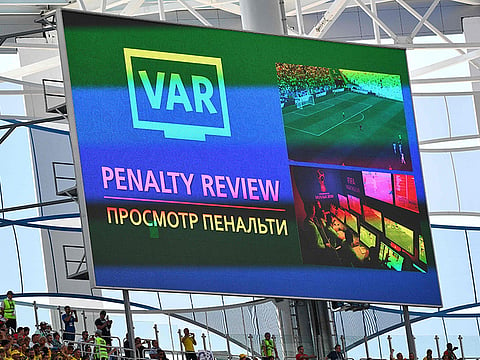The Big Question: Is the World Cup better off thanks to VAR?
Is the World Cup better off thanks to VAR?

Yes
Ashley Hammond
Look, there were bound to be some teething problems initially and you would have been mad if you thought the transition was going to be smooth but on the whole, and at the end of this tournament, we will look back and judge video assistant refereeing (VAR) favourably.
The best example of it having made a positive impact so far is in Sweden’s 1-0 win over South Korea on Monday.
If the VAR team hadn’t alerted the referee to a foul inside the box that game would have ended goalless and Sweden would have been denied their first win in an opening game of a World Cup since 1958.
That’s huge, and could ultimately — and most of all fairly — change the face of Group F.
Now, I agree, it also appears that VAR hasn’t worked in some areas. However, that’s not the technology at fault but rather the implementation of the technology and the training of those using the technology.
This will only improve though and it’s still early days. For example, the France penalty against Australia was a bit harsh and then there were two blatant off-the-ball fouls on Harry Kane inside the box during England’s 2-1 win over Tunisia.
Referees appear to be relying too much on VAR to pick up infringements and by that time penalties are either late to be awarded or let go completely.
Fifa needs to clarify why certain things are picked up and other things are let go, but the simple answer is that it all still boils down to a human decision, and humans make mistakes or have differing opinions.
Again, this will improve though as further examples help forge a better consensus for future decisions. Even with that element of doubt still there though, I still feel football is in a much better place with those extra set of eyes than without it.
As a fan, you should feel a lot more comfortable about the chances of your team getting a decision go your way, if it is 100 per cent justified.
No
Matt Smith
Quite simply, this technology is still too embryonic to be implemented at a major tournament such as the World Cup. Sweden gained — justifiably — from the VAR decision in their game against South Korea, and that is all well and good.
But what about Brazil?
Players complained that defender Miranda was pushed by Steven Zuber when he headed home Switzerland’s equaliser early in the second half of their Group E opener on Sunday.
They also believe Gabriel Jesus was manhandled inside the penalty area and should have been awarded a spot kick.
Neither incident was reviewed. They were both — in the words of Fifa — “missed incidents in clearly defined match-changing decisions”.
Until the system has ironed out such inconsistencies — how about following the tennis formula and give each coach three challenges each? — it will be flawed.
Some will gain from decisions being reversed by the replays, while others will feel aggrieved that referees did not refer a contentious decision. So nothing has changed. It is still as inconsistent as ever.
Then there is the France game against Australia. When the ref awarded a penalty after reviewing an incident on the edge of the area, it seemed to be even more divisive than if it were left to the naked eye, with many saying it should not have been a penalty at all. Josh Risdon got a touch on the ball while sliding in on striker Antoine Griezmann — ergo: no penalty. But it was given and a whole new can of worms was opened.
I could go on all day about wrong decisions, missed calls and human error but the bottom line is we are better off without it, at least until a full-proof plan is in place to eradicate inconsistencies. For all their faults, at least you knew where you stood when it was down to the man in black and him alone.



